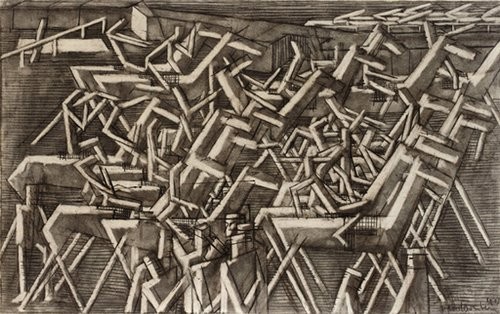The Whitechapel Boys
05 Apr - 20 Sep 2009
THE WHITECHAPEL BOYS
5 April-20 September 2009
The Pat Matthews Gallery (Gallery 4)
In 1901, 25% of the population of east London was Jewish, hailing from central and eastern Europe. A group of remarkable artists and writers emerged from this diaspora and came to be known as the Whitechapel Boys. Using the Whitechapel Library as a meeting place, their discussions contributed to the founding of British Modernism.
Strongly iconoclastic, the painters and sculptors in the group began to experiment with dynamic form and a move to abstraction, with works such as Racehorses by David Bomberg, Study for Rock Drill by Jacob Epstein and Rabbi & Rabbintzin by Mark Gertler.
The writers and poets searched for innovative prose to express their philosophical and political views. The show includes the first edition of Stephen Winsten’s Chains, John Rodker’s Collected Poems from 1912-1925, and items from their personal collections, such as the manuscript of Clare Winsten’s autobiography and Alfred Wolmark’s first sketch books.
Presented alongside are catalogues, correspondence and press cuttings relating to their work and milieu. The Whitechapel Boys looks at the origins of a company of radical thinkers who overcame the restraints of living in the impoverished East End and became a vibrant avant garde.
5 April-20 September 2009
The Pat Matthews Gallery (Gallery 4)
In 1901, 25% of the population of east London was Jewish, hailing from central and eastern Europe. A group of remarkable artists and writers emerged from this diaspora and came to be known as the Whitechapel Boys. Using the Whitechapel Library as a meeting place, their discussions contributed to the founding of British Modernism.
Strongly iconoclastic, the painters and sculptors in the group began to experiment with dynamic form and a move to abstraction, with works such as Racehorses by David Bomberg, Study for Rock Drill by Jacob Epstein and Rabbi & Rabbintzin by Mark Gertler.
The writers and poets searched for innovative prose to express their philosophical and political views. The show includes the first edition of Stephen Winsten’s Chains, John Rodker’s Collected Poems from 1912-1925, and items from their personal collections, such as the manuscript of Clare Winsten’s autobiography and Alfred Wolmark’s first sketch books.
Presented alongside are catalogues, correspondence and press cuttings relating to their work and milieu. The Whitechapel Boys looks at the origins of a company of radical thinkers who overcame the restraints of living in the impoverished East End and became a vibrant avant garde.

